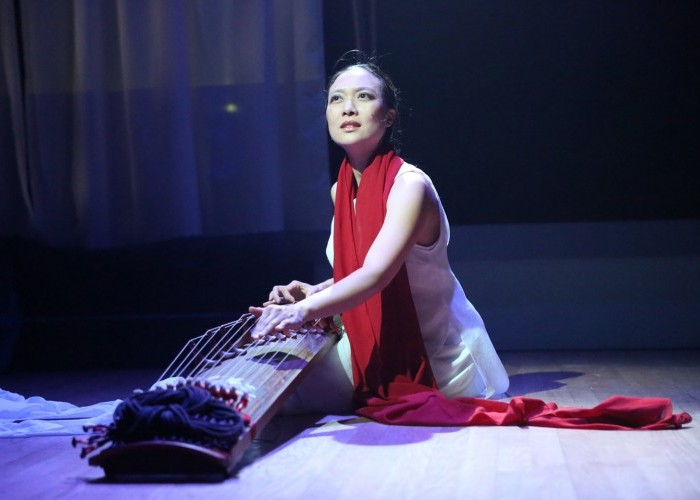Jan 13, 2026 2:09 PM
More Trump-Kennedy Center Cancellations
The fallout from the renaming of the John F. Kennedy Center for the Performing Arts to include President Donald…

“It’s always been there,” multi-instrumentalist and vocalist Jen Shyu said about a wave of vitriol aimed at Asian Americans during the coronavirus pandemic. “These events, they’re just an excuse for people.”
(Photo: Steven Schreiber/pirecordings.com)Shyu met Jang—and his AIR cofounder, saxophonist Francis Wong—when she was studying opera at Stanford. She took an interest in singing jazz standards, before having a conversation with Jang about her various talents.
“[Jon] said, ‘Jen, I just had a vision that you’re going to integrate everything—you’re going to bring everything together,’” Shyu said, her voice thick with fond remembrance. “I had no idea what I was doing at the time. So, for him to say that, it was like a guiding light for me.”
That light led Shyu to Taiwan and East Timor, where she spent years researching the indigenous music of her ancestors, eventually creating “a new music that was deeply informed by what I was experiencing—learning about all this other music.”
THE PARALLELS BETWEEN AIR and the Chicago-based, African American-focused Association for the Advancement of Creative Musicians are evident, both in their fight for social and racial justice, and in their musical aesthetics, which trend toward freer forms of composing and improvising. Similarly, Asian Improv aRts Midwest became active in 2004, when Chicago bassist Tatsu Aoki rebranded his own arts organization in solidarity with Jang and Wong’s outfit. Saxophonist Mai Sugimoto moved to the Chicago area from Japan at age 11, and ultimately found herself, geographically and musically, within Aoki’s community.
“My father is a big jazz fan,” Sugimoto said, speaking from her home in Chicago’s Noble Square neighborhood. “He exposed me to a lot of jazz and black music when I was a child in Japan.”
Sugimoto began to study the saxophone in grade school, and then in college at Northern Illinois University and the University of Cincinnati, learning jazz like many other American students, yet feeling tremors of casual racism in the process.
“People’s expectations [are] very low,” she said about encountering other musicians’ initial assessments of her work. “A lot of people [would say] things like, ‘Oh, I didn’t know Asians could swing like that.’”
Sugimoto first connected her music with her heritage in 2011, when she founded the ensemble Hanami (the Japanese word for the viewing of cherry blossoms) to raise funds for the survivors of an earthquake and tsunami that devastated Japan. She has continued to develop her own sound and style, shaped by her experiences as an Asian.
“I’m still fighting my own ideal of how saxophone should sound or should be played,” she said. “You know, a more muscular approach that we’re used to hearing and have seen in the development of jazz. ... But I’m trying to be more honest about how I feel, how I see my own culture … making something unique to me and not just fitting into jazz or a creative music genre.”
JON HATAMIYA—A FOURTH-GENERATION American from Davis, California—played basketball and baseball as a kid, and learned the blues and how to swing in his middle school and high school jazz bands. His mother, Nancy, was deeply involved with the Bay Area arts community, and knew AIR’s cofounders.
A recent graduate of the Thelonious Monk Institute of Jazz Performance (since renamed the Herbie Hancock Institute of Jazz), Hatamiya represents a new generation of exceptional jazz minds. The trombonist hasn’t had to struggle much with overt racism or his own identity in his life or career. And in many ways, he’s a symbol of how far jazz has come in embracing players of all backgrounds.
“I do feel lucky that those people have paved the way,” Hatamiya said of Asian-American pioneers like Jang and Shyu. “[Asian jazz musicians have] become more commonplace and acceptable, and it’s not even a big deal that I’m out there playing. I don’t take that for granted.”
There are those moments, though. Hatamiya recounted an interaction on a funk gig in New York when a bandmate turned to him and said, “You’re Japanese? Man, you’re not supposed to be able to play like that.”
Hatamiya realized it was meant as a compliment, but it still rubbed him the wrong way.
“I play how I play, and the way that I play is not trying to be a caricature of a black musician, and it’s not trying to copy something.”

Belá Fleck during an interview with Fredrika Whitfield on CNN.
Jan 13, 2026 2:09 PM
The fallout from the renaming of the John F. Kennedy Center for the Performing Arts to include President Donald…

Peplowski first came to prominence in legacy swing bands, including the final iteration of the Benny Goodman Orchestra, before beginning a solo career in the late 1980s.
Feb 3, 2026 12:10 AM
Ken Peplowski, a clarinetist and tenor saxophonist who straddled the worlds of traditional and modern jazz, died Feb. 2…

The success of Oregon’s first album, 1971’s Music Of Another Present Era, allowed Towner to establish a solo career.
Jan 19, 2026 5:02 PM
Ralph Towner, a guitarist and composer who blended multiple genres, including jazz — and throughout them all remained…

Rico’s Anti-Microbial Instrument Swab
Jan 19, 2026 2:48 PM
With this year’s NAMM Show right around the corner, we can look forward to plenty of new and innovative instruments…

Richie Beirach was particularly renowned for his approach to chromatic harmony, which he used to improvise reharmonizations of originals and standards.
Jan 27, 2026 11:19 AM
Richie Beirach, a pianist and composer who channeled a knowledge of modern classical music into his jazz practice,…